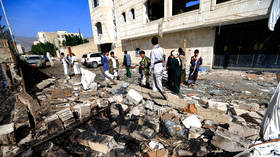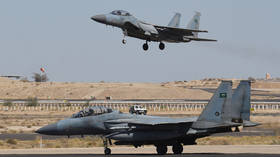Rights groups accuse French arms makers of war crimes complicity

Three human rights organizations have sued French arms manufacturers Dassault Aviation, Thales, and MBDA France for selling weapons to Saudi Arabia and the United Arab Emirates, charging that the sales amount to complicity in alleged war crimes committed by the Saudi-led coalition in Yemen.
The lawsuit, initiated by the European Centre for Constitutional and Human Rights (ECCHR), the Mwatana for Human Rights, and Sherpa International, focuses on 27 airstrikes targeting four hospitals, three schools, and several refugee camps. All were said to be far from military targets and involved the use of weapons manufactured by the three companies.
Dassault is specifically being sued for making possible attacks “against civilians and civilian infrastructure” by selling to the UAE and providing maintenance for some 59 Mirage fighter planes and “encouraging” violations of international human rights law by selling 80 Rafale planes to the country. MBDA France’s sale of Storm Shadow and Scalp air-to-ground missiles and Thales’ sale of Damocles guidance pods and Scales missile guidance systems are also condemned in the suit.
“Companies have their own responsibility to do their risk assessment and they have been trading with Saudi Arabia and the UAE for years,” the ECCHR’s Canelle Lavite told Reuters on Thursday, explaining that after five years of war in Yemen the arms dealers were certain to have encountered “these abundant and consistent international reports that document the coalition’s violations” in Yemen. “If we provide weapons to an alleged perpetrator of recurring crimes, we facilitate the commission of these crimes,” she continued.
They should no longer be unaware that their exports can lead to possible criminal liability.
“The coalition’s airstrikes have caused terrible destruction in Yemen. Weapons produced and exported by European countries, and in particular France, have enabled these crimes,” the executive director of Mwatana for Human Rights, Abdulrasheed al-Faqih, told Reuters, arguing that “seven years into this war, the countless Yemeni victims deserve credible investigations into all perpetrators of crimes, including those potentially complicit.”
Al-Faqih claimed his organization has documented over 1,000 attacks on civilians that left 3,000 dead and 4,000 injured.
The three NGOs are not the first to sue leading figures in the coalition. French courts are already hearing complaints against Prince Mohammed bin Zayed al-Nahyan of Abu Dhabi, Saudi Prince Mohammed bin Salman, and even France’s customs authority.
Amnesty International France and the ECCHR sued the customs authority in September in an effort to force them to release records of exports of weapons to Saudi Arabia and the UAE, calling their refusal to do so up to that point a “disproportionate interference with the fundamental right of the public to receive information.” France, the NGOs argued, had continued to ship weapons and provide maintenance and training to the belligerents despite “overwhelming evidence of attacks committed by the Saudi Arabian-UAE military coalition…against civilian populations and infrastructure” in Yemen.
The UN confirmed in 2020 that military equipment provided by Western nations was fueling the conflict in Yemen, which has been raging since 2015, leaving upwards of 150,000 dead and driving millions to the brink of famine.
Saudi Arabia has repeatedly denied targeting civilian infrastructure, insisting instead it has pursued military targets in response to perceived threats. The UAE has responded to UN accusations of war crimes by accusing the organization of overlooking Houthi culpability in civilian suffering.
A truce between the Saudi-led coalition and the Houthi rebels, the first since 2016, has been in effect since April 2.













